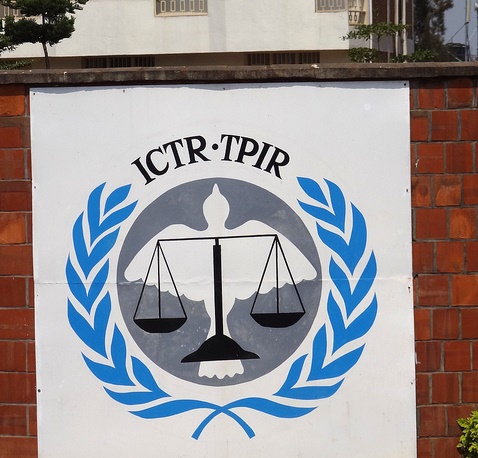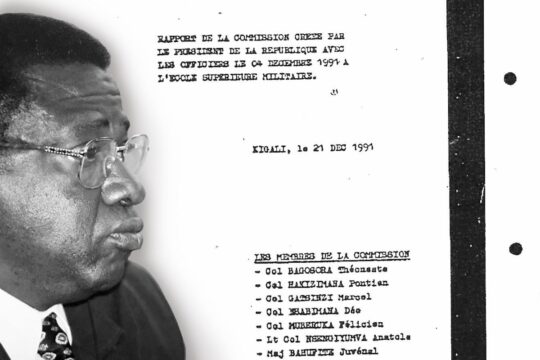As the UN’s International Criminal Tribunal for Rwanda (ICTR) closes its doors, Kigali’s assessment of its work is less critical than in the past. The virulent tone of the past is sometimes even replaced by praise, although Rwanda still points to some failings. Relations have never been easy between the Rwandan government and this Tribunal, which was set up by the UN in November 1994 and handed down its last judgment this December 14.
“The ICTR has done formidable work,” says Rwandan Attorney General Richard Muhumuza. He cites in particular an ICTR ruling that says the genocide perpetrated against Tutsis in Rwanda in 1994 is an “adjudicated fact” of “common knowledge” that no longer needs to be proven in court. The ICTR took “judicial notice” of this fact on June 16, 2006 in the trial of three former leaders of the MRND, the political party of ex-president Juvénal Habyarimana. “There is no reasonable basis for anyone to dispute that, during 1994, there was a campaign of mass killing intended to destroy, in whole or at least in very large part, Rwanda’s Tutsi population,” the judges decided unanimously, putting an end to a debate that had lasted for years between the Prosecutor and some defence lawyers.
Rwandan Attorney General Muhumuza also says that although the ICTR tried only a small number of suspects, it “convicted most of them in a judgment that will serve as a precedent in the future”. Those tried and convicted by the Tribunal, based in Arusha, northern Tanzania, include former Prime Minister Jean Kambanda and other members of his government, former army generals, churchmen, businessmen and members of the media.
Fighting impunity
Naphtal Ahishakiye, executive secretary of genocide survivors’ organization Ibuka (meaning remember in the Rwandan language) says that “these top genocide suspects” are therefore no longer a threat because they are in prison and cannot plan another genocide or keep spreading “genocidal ideology”.
He thus thinks that despite certain failings, the ICTR has contributed to the fight against impunity.
As for the ICTR’s failings, Muhumuza points firstly to the fact that there are still eight accused on the run, despite a twenty-year search and considerable UN funds provided to the Tribunal. “It is regrettable and incomprehensible,” he says.
The ICTR handed over the case files of six fugitives to the Rwandan judicial authorities, as part of its closure strategy. It is now up to Rwanda to find them, have them arrested and tried. “It’s a difficult task,” says Ahishakiye, but he hopes that with the help of Interpol and cooperation from other countries, the fugitives can be arrested and brought to justice for their crimes. In early December, one fugitive was arrested in the eastern Democratic Republic of Congo. Former Rwandan mayor Ladislas Ntaganzwa was transferred to the Congolese capital Kinshasa, pending his possible transfer to Rwanda.
Ibuka also criticizes some of the ICTR’s judgments. “We have been surprised more than once by acquittals or by light sentences handed down despite reliable evidence from witnesses including survivors,” says Ahishakiye. He believes that certain judicial decisions of the ICTR could be a hindrance to reconciliation between Rwandese.
Who planned the genocide?
Another failure of the ICTR, according to Kigali, was its relative inability to establish who planned the genocide. “If even Colonel Théoneste Bagosora, who was accused of masterminding the genocide, was finally acquitted of conspiracy to commit genocide, then who planned it?” asks a Catholic priest.
But Alexis Musonera, a lawyer of the Kigali Bar, says this is because the ICTR’s mandate was limited in time. The judges were restricted by that, he adds, and could not hand down convictions on the basis of evidence dating from before January 1994. Musonera is referring to an ICTR Appeals Court ruling in the so-called Media Trial, which delivered a blow to the Prosecutor’s strategy. The ICTR’s mandate covered only the calendar year 1994, from January 1 to December 31.
Another criticism that can also be put down to the ICTR’s founding texts is its lack of any reparations mechanism for victims. “Without reparations for victims, justice is incomplete,” says Attorney General Muhumuza. Like the executive secretary of Ibuka, he regrets this and holds the UN Security Council responsible.
Ordinary Rwandan citizens also recognize the ICTR’s contribution to fighting impunity. But some survivors who are still struggling with the consequences of the genocide think ICTR convicts have a scandalously good standard of living. “Our butchers are living in five-star luxury at UN expense and receiving visits from their wives while women and girls raped during the genocide are dying slowly, eaten by sickness, loneliness and shame,” says one genocide widow, referring to the right of ICTR prisoners to conjugal visits in a private room outside their cell.
After some hesitation, the ICTR administration agreed to this right, notably to be in line with the practices of the International Criminal Tribunal for the former Yugoslavia (ICTY), another tribunal set up by the UN.






